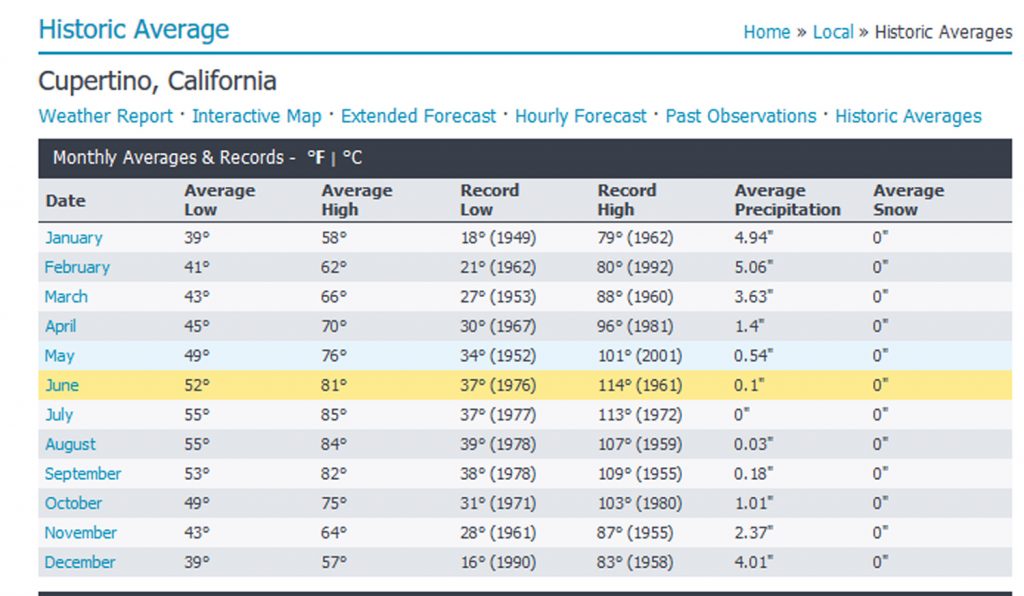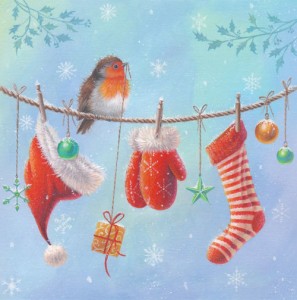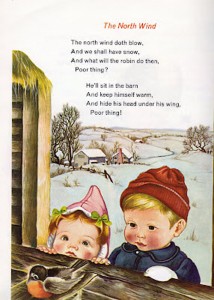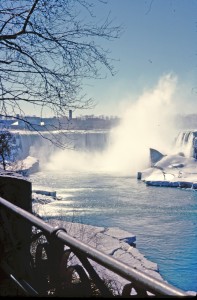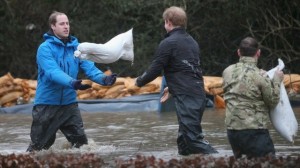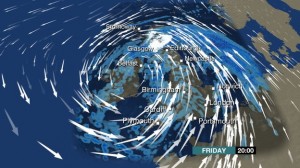Archive for the ‘weather’ Category
The rain in Camelot
When I arrived in California from England’s green and rainy land, I thought I must have landed in Camelot. Remember that song from the 1960 Lerner & Loewe musical?
The rain may never fall till after sundown
By eight, the morning fog must disappear
In short, there’s simply not a more congenial spot
For happy-ever-after-ing than here in Camelot
It rained for a week or two after we arrived, from late May into early June. My new neighbors kvetched, “Enough already!” After a normal rainy winter, early spring had been dry. Now the rains had started back up, and they didn’t like it. I, however, was enchanted. It truly only rained at night; the days were warm and sunny.
Eventually the rain stopped. Grass on the hills turned from green to gold. I had learned about Mediterranean climate in geography class at school: how it occurs only in five parts of the world, on the western sides of continents, between roughly 30 and 45 degrees north and south of the Equator. How it is associated with rotating high pressure zones that migrate through these sub-equatorial latitudes depending on the angle of the sun, bringing clear skies in summer and moving equator-ward to allow frontal cyclones to bring rain in winter.
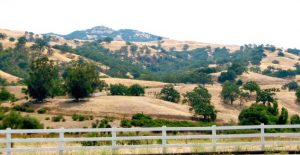
A classic California landscape: Mt. Hamilton, to the east of Cupertino. Image from http://www.pleinairmuse.com/
Now I was living this rare climate. Warm sunshine day after day. Golden hills faded to a dusty tan. As summer crept toward fall, I found myself longing for the rain and dark I had hated in England. I discovered that my neighbors, too, eagerly awaited the first rain of the season. We celebrated together as the sky darkened and the first drops fell. I was learning to be a Californian.
Robin redbreast on a fence
I still ponder why it meant so much, that Christmas morning in England in the 1960s, that a robin sat on the back fence. The field behind the fence was white, the fence wires thick with hoar frost, and the little red-breasted bird made the scene perfect. Finally, I told myself, a ‘real’ Christmas.
I have tried for many years to clarify my feelings about the disconnect between the traditional trappings of the season and my experience of growing up in New Zealand, where the seasons are reversed. My childhood Christmas memories are of summer: the tree laden with oranges in my grandmother’s garden where we hung our presents and picnicked on the lawn; the scent of magnolia blossom outside the church on Christmas Eve.
Also the Christmas cards with their images of snow (which I’d never experienced) and yes, the English robin. I knew about robin redbreast from the old nursery rhyme, but until that Christmas I hadn’t seen one.
Now on the coast of Northern California, I have a different understanding of how to celebrate the winter season. Our multicultural society recognizes many winter festival stories and traditions: the birth of Jesus in a stable, the menorah candles of Hannukah, the Swedish light-bringer St. Lucia, the gift-bringer St. Nicholas (known also as Santa Claus), and many others. The celebration that holds the deepest meaning for me now is Winter Solstice, the return of the light. From summer to winter, I note where on the horizon the sun sets, and how the darkness grows. Even as clouds gather, the place where sun disappears into ocean fogbank moves steadily to the south. When the prevailing westerly wind shifts to the southeast, I know to expect the winter rains. Sometimes a shower or two, sometimes, such as this past week, a prolonged deluge that floods rivers, downs power lines, and closes roads.
Meanwhile, the earliest spring flowers are breaking bud, and over-wintering birds gather hungrily at my feeder: Steller’s jay, spotted towhee, hermit thrush, acorn woodpecker, hordes of white-crowned sparrows. I love them dearly. I am happy that I have learned to understand the connection between the flow of seasons and human efforts to explain them with stories and festivals. And I still have a place in my heart for the memory of that cheery robin redbreast who brightened an English winter.
Coldness depends on what you’re used to
A letter dated April 5, 1963 has set me to thinking about how the human body adapts to temperature differences. Tony and I, and my sister Patricia, who lived with us in Windsor, England, were luxuriating in warmer weather after the Big Freeze, the coldest winter Britain had seen for over 200 years. We’d survived ice-covered walls and windows and frozen pipes, with two paraffin (kerosene) heaters our only source of heat. (There was also a wall-mounted electric heater, but it gobbled shillings and half-crowns as if it were starving.) Then our elder sister, Evelyn, arrived from Syracuse, New York, where she had been completing her doctorate. Her letter to our parents, published in her “Letters From America 1960–1963” (University of Waikato, 2005) tells the story:
I am sitting huddled over the paraffin heater in Maureen’s living room… I am still not acclimatised. This place is so cold and I miss American central heating. Here it is cold both inside and out; there is no escape. I am wearing nearly all the clothes I possess, it seems, and I sleep under a mountain of blankets, but still it is cold. In Syracuse, though it is snowing and below zero outside, once inside we took off all our heavy coats etc. and just a cotton blouse, skirt and sandals were sufficient. I am not used to wearing all these clothes all the time, but I guess, if you live here long enough, you get used to it.
On our way to England the previous March, Tony and I visited that apartment in Syracuse where Evelyn lived with fellow students from South East Asia. Dirty snow lined the streets, the sky was gray, the apartment a stifling 80 degrees.
Evelyn left space in her letter for me to add a paragraph:
…It isn’t really as cold as Evelyn makes out, although today I must admit is rather bitter. But while the rest of us are dehydrating in the hot-house fug inside, she still complains of the cold, so I don’t know what we can do.
Pat, Tony and I would surreptitiously open doors and windows, but nothing could stay open for long. We all suffered.
A little poking around the internet informs me that getting acclimated to temperature differences typically takes about two weeks, a bit longer for adjusting to cold than to heat. This makes it hard for travelers who spend only a few days in one place. People who live in extremely hot or extremely cold climates have adapted over the eons. In arctic areas they have large, compact bodies with relatively small surface areas from which they can lose their internally produced heat. In addition, they have made technological changes such as insulated clothing and houses, and cultural adaptations such as sleeping in a huddle with their bodies next to each other. In hot parts of the world people are more likely to be tall and slender, with low body mass, and to limit their activities to cooler parts of the day.
For the past 15 years I’ve lived in Mendocino, CA, where the average temperature ranges from the mid-40s to the low 60s Farenheit, and 75°F is a hot day. The county seat, Ukiah, where we sometimes have to go for business or medical appointments, is inland, or as we say, “over the hill.” There the summer temperature average is in the mid-90s and my body tells me: Nah, that’s way too hot. How can people stand it?
Plumbing crisis brings neighbors together
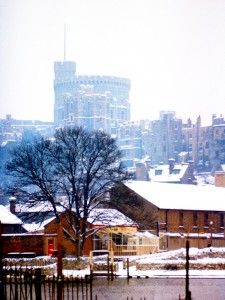
Windsor Castle in the snow, January 1963. We lived in the town below the castle. Photo by Tony Eppstein.
The winter of 1962-63, my first in England, was the coldest Britain had known in over 200 years. First the fog crept in. My nostrils tightened against the thick yellow damp, sour with the smoke of coal fires and diesel trains. As November wore on and the cold deepened, fog froze into hoar frost that thickened daily on the power lines until they resembled sagging ropes.
Snow began the day after Christmas. All January it snowed and froze and snowed again. Transportation systems ground to a halt. The River Thames froze over. The inside wall of our apartment kitchen, wet since November and already black-mottled with mildew, glazed over with ice. On the outsides of buildings, ice congealed around plumbing outlet pipes like candle wax dripped from lighted candles. Water pipes froze and burst. The clatter of buckets as the water truck made its rounds became a familiar sound in our Windsor neighborhood.
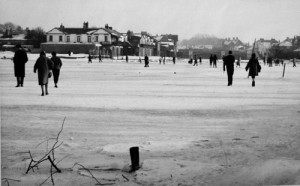
Windsorians walk on the frozen Thames.
A view towards Windsor Bridge photographed on 24 January 1963. Image from the Royal Windsor Website
A side benefit of the bad weather was that we got to know our neighbors. Here’s a letter I wrote to my parents:
23 January 1963
I think we must be drifting into another ice age – the weather here continues to get colder every day. All sources of fuel – coal, gas electricity, and even paraffin, are in short supply, and everyone is fighting a losing battle against frozen pipes and general seizing up.
We had our fun and games over the weekend. We were woken fairly early on Saturday morning to terrific shouting and hammering on the door. We staggered out, to find that the Hoopers were being flooded out – their kitchen was an icy pond, and water was pouring through the light fitting in the ceiling. We turned off all the taps we could find, someone somehow found a plumber, and after he, Tony and Peter [Hooper] had hacked their way through the several inches of ice outside the front gate, and even more ice on top of the valve, they managed to get the mains off. Next thing we tried to get in touch with Stan Fricker, from whose flat the water was coming – he was at work, and we had visions of him coming home to a complete flood. By the time he arrived we had swished most of the water out of the kitchen, and had got all the heaters we could find in to dry it out. So we all trooped up into Stan’s bathroom, which is directly above the Hoopers’ kitchen and, to our surprise, found very little trace of water. We bailed the solid chucks of ice out of the bath, which had been frozen up for days, and Stan and Tony got to work on the floorboards, which were suspiciously damp. They managed to raise a couple, and discovered that the break in the pipe was right underneath the bath, which had been very recently closed in and modernised with plywood, fresh paint, and what not. A brute to get at.
The next thing to do was to find a plumber to fix it – easier said than done – “Oh no, love, we couldn’t possibly let you have one till Monday.” I don’t know how many pennies we spent on phone calls over the weekend, but at fourpence a call we went through several shillings. But we still couldn’t get a plumber till Monday, and late Monday afternoon at that. So we borrowed buckets of water from a neighbor, and puddled along with little dribs of washing where necessary, keeping most of it for drinking. It was pretty messy. At least in the old days they had facilities in keeping with such conditions – but try using a modern-type lav when you have nothing but half a bucket of dirty water to flush it with. That was the first thing that Margaret [Hooper] did, with great ceremony, when the plumber finally managed to get the water on again for us on Monday evening. Our lav had to wait a few hours longer – the remaining water in it had got so iced up that it had to be very carefully thawed before anything would move. And we still can’t have a bath – the outlet pipes in the bathroom are frozen up and, according to the plumber, that will just have to wait till the thaw.
The kitchen outlet, which comes down in the same place – down the outside wall on the coldest side of the house, now shows signs of doing the same thing, which would be choice. I am shortly going to do some washing, and hope that the gallons of hot water from the tub will deter it. Still, we could always throw our slops out the window – if we could unfreeze the windows enough to open them, that is. Might as well be really primitive.
We are getting rather advanced ideas on the proper requirements of a house in this climate – they do not agree very much with the conventional buildings most people live in here. Definitely central heating, double glazing, and interior plumbing.
Other people’s weather
An ethereal music filled the air as Tony and I stepped down from the Greyhound bus at Niagara Falls in March 1962, a music so sweet and high it seemed to come from some magical place. I gazed about me. Nothing but bare trees and an almost empty parking lot. A wind that stung my ears. Then I saw them: icicles, many inches long, hanging from every twig and tinkling against each other with every gust.
Growing up in the subtropical north of New Zealand, I did not see snow until I was an adult. Our winters had heavy rain and an occasional frost, enough to whiten the grass and form thin sheets of ice on puddles. But nothing like this: the gigantic falls themselves half frozen and the temperature the coldest I had ever known. Historical records tell me it was probably about 30°F. (though the wind chill factor would have made it seem colder), and that the winter was pretty much a normal one.
We had broken our journey from New Zealand to England in New York to visit my elder sister, who was completing her doctorate at Syracuse University. As we rode the Greyhound bus upstate to Syracuse, what fascinated me as much as the landmarks my sister pointed out were the piles of dirty snow everywhere. I began to comprehend the northern hemisphere stories I had grown up with, where winter was a time of death and darkness, the weather something to be feared, and the spring thaw a time of great rejoicing.
Having recently passed through the tropical miasmas of Panama, I was also discovering that people could learn to live in places where the climate was not friendly, though the strategies they used to deal with the climate sometimes left us puzzled. In Fort Lauderdale, Florida, for example, where our ship had berthed for a day on its way to New York, we were stunned by the difference between the searing heat outdoors and the air-conditioned iciness inside the big stores.
Tony and I realized then that that we were just starting on the great adventure of learning how the rest of the world lives.
Maureen is exploring the contents of an old black filing cabinet in her attic, which contains 55 years of her writing notes
Down by the Thames
Fifty years later, I’m startled to see the names of English villages I once knew show up on the BBC international news. Huge storms slamming the U.K. have flooded the Thames Valley west of London. I remember Datchet. My husband found his first job there when we moved from New Zealand to England in the early 1960s. On a map this area just west of Heathrow Airport shows more blue than green. The River Thames meanders through, making oxbows and loops. Manmade reservoirs, lakes and channels attempt to contain the water. The map shows the familiar stops on the railway line from London: Wraysbury, Sunnymeade, Datchet, Windsor, where we found a place to live. Today, princes William and Harry are helping to pile thousands of sandbags in Datchet. The weather map shows more floodwater coming.
What I remember most about Datchet is a cricket match. Our first summer in England, and we marveled that the sun did not set until about 10:00 pm. We were exploring the village one evening, and happened on the Datchet Cricket Club. Sunlight was golden across the grass, bathing the white flannels of the players and the trees surrounding the pitch in a romantic glow. Cricket is played in New Zealand, so we knew the game and appreciated its stately pace and formal rituals. The scene has stayed in our minds as the exemplar of the England we imagined when we left New Zealand.
Canticle for the Winter Solstice
I plan to read this poem at tonight’s Solstice event at Gallery Bookshop in Mendocino. Obviously it was written in a year other than 2013. We’ve had no rain all month, and none in the extended forecast, so face the likelihood of a drought year. I think of this piece as a kind of prayer.
Canticle for the Winter Solstice
I honor the rain that plummets from a leaden sky
on this day when the dying sun returns to life.
I honor the wet earth where fungi lift
the smells and secrets of their darkness
into forms potent with wildness
and fallen leaves grow slimy with decay.
I honor the sudden green suffusing
the face of the sun-scorched hill,
like the blush of knowledge in a woman’s face
after her first coupling.
I honor the flame of candle and hearth
that draws to itself the breaths
of all whose lives have sometime crossed,
mingles and transmutes them into warmth
and sends them out into the rain
where they caress the tender growing tips of trees.
Before the Light Fails
I have been struggling all week to find words for the emotions stirred by a yellowish twilight that came one evening at sundown, after a day of rain. It does not invoke despair, like Emily Dickinson’s certain Slant of light. But it does cause me to pause whatever I am doing, to stand at the window and simply gaze.
When I was a child, my mother brought home a painting she had fallen in love with, and hung it on our livingroom wall. It was a street scene in an English village, all somber grays: gray stone row houses on a gray cobbled street that was wet with rain. Uphill from the houses stood a gray stone church, from a window of which shone a rectangle of yellow light. If I saw this picture again today, I might dismiss it as sentimental. But what caught my mother’s attention, and what makes me remember it now, is that the artist captured that moment of otherness as a storm clears, when we see beyond the everyday world, that strange and solemn moment before the light fails.
Between Storms
Mid-morning the sky clears, a break between storms. Our generator rumbles. The power is out, a downed line somewhere back in the forest. So is our cable internet service. From the house we can see spume lifting high over the cliffs. Nothing for it but to go there, to walk the cliff path around the Mendocino Headlands, to exult in the roar, the tumble of white, the spritz of salt spray on our faces. At the big blowhole near Main Street, huge plumes of water rise with a satisfying ker-thump.
We decide to avoid the muddy parts of the trail further on, and head up to Main Street. Nearly all the stores are closed because of the power outage. But Gallery Bookshop, on the corner of Main and Kasten, is open, though unlit. We step in to say hi.
“Electricity, schmelectricity,” laughs Christie, the owner. “We never close. We just do everything on paper and input it later. We have the little swipe-swipe machine for credit cards. The only thing that’s hard to do without the computer is book searches.”
Tony finds a novel he wants, Hilary Mantel’s Wolf Hall, winner of the 2009 Man Booker Prize. At the checkstand in the center of the store we chat with Christie and two other staff members, Johanna and Jane, about this book and another we’ve been reading lately, A.S. Byatt’s The Children’s Book. I love the cosiness of these conversations about books. I love being a local in this remote and beautiful place.
The Storms of Yesteryear
Intermission at a Sunday afternoon concert, a knot of people take the air in the porch of Preston Hall. “That’s a beautiful sight,” a woman says, pointing to the rain sweeping in across Mendocino Bay. We are all excited. The weather gurus have warned that this rain is just precursor to a series of large storms expected to hit over the next several days.
“Remember that time we we had twenty, no forty inches of rain in one storm?” someone says.
“What about the time that rogue wave went right over the lighthouse?” Point Cabrillo Light Station, a one-story structure with a turret on top that holds a magnificent first order Fresnel lens, sits on a crumbling headland about fifty feet above the water.
“Not over the light, surely?”
“Over the roof, at least.”
Much damage?”
“Oh yes.”
I mention the first time Tony and I came to Mendocino, in 1970. In Navarro River Redwoods State Park, through which you drive to reach the coast, we were fascinated to see a plaque high up the cliff on the side of the road, marking how high the waters had come in the big flood. The date was 1965, I think. The plaque is gone now, but you can still see evidence of that flood. A whitish fungus covers the trunks of the redwood trees up to the waterline. It is particularly visible at night, illuminated by car headlights, a ghostly presence in the blackness of the forest.
The Navarro River still floods in major storms. Everyone who lives here on the coast quickly learns the alternate routes to reach inland destinations. Tree limbs fall. Mud slides. Sometimes all the roads are closed. Sometimes the power goes out for days. We learn how to hunker down. And afterward, we will have more stories.
